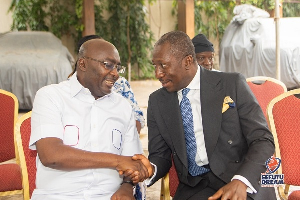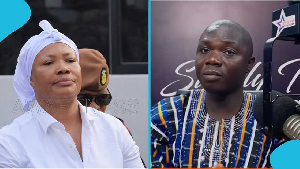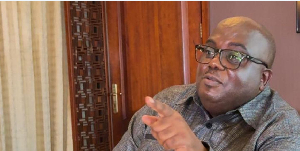What did Ghana expect? I am finding it difficult to understand what exactly Ghana and for that matter the Daily Guide newspaper expected at the just-ended 2010 World Bank’s annual meeting in Washington DC. I am as well astonished why the World Bank Country Director, Ishac Diwan should apologize for the World Bank displaying pictures that truly reflect the state of present-day Ghana. A rejoinder by the World Bank published on Ghanaweb on October 20, 2010, seeks to only pacify the country and is as such an attempt to conceal the reality on the ground. This to the best of my knowledge should not warrant any apology. The Daily Guide newspaper on Monday, October 18, 2010 reported that the World Bank has displayed ‘horrible pictures’ on its computers installed on the 3rd Floor of the International Monetary Fund (IMF) HQ2 Building located on the 1818 Pennsylvania Street in Washington DC. This was part of the meeting by the World Bank and the IMF that brought together central bankers, ministers of finance, private sector executives, and the academia to deliberate on issues of global concern. According to the reporter, “This time round, the pictures displayed by the Bretton Woods institutions portrayed Ghana as a country full of hungry and miserable people.” The deserving question to pose is that is Ghana free from poverty and hunger and what is ‘horrible’ about what is rightly part of us. On a simple premise, there is no doubt that Ghana is a country that offers extreme poverty and hunger to majority of the people. Definitely, it is not far from right to say that Ghana is already ‘black!’
The picture as shown by the newspaper that depicted a girl bathing in the open space is never foreign to this country. Neither one of the pictures, according to Joy News (www.myjoyonline.com) on October 19, 2010 that showed half-naked women breastfeeding their kids and portrays a country high on poverty levels is an extreme exaggeration. This is exactly the reality on the ground. We must admit that Ghana is a poor country and a lot of people go to bed hungry. Though Ghana is known to have made impressive strides for the past 12 years towards uplifting its once unsavory economy one cannot deny the fact that majority of the people are still hooked on extreme poverty. I have been one of the critics of the operations of the World Bank and other Bretton Woods institutions especially with their stringent conditions attached to aids leaving recipient countries with little or no option to decide on their own. But that does not give the indication that I should be economical with the truth. In essence, I will never agree on the subject that “World Bank Paints Ghana Black”. Rather, the World Bank is informing the country to sit up. Known to be one of the proprietors of natural resource in the world and with increased foreign aid, Ghana was expected to be a haven that would soothe the excruciating pains of tattered penury amongst its people. Contrary is the situation on the ground. It is about time this country stood for the truth in all facets of life. According to the World Bank country director, some of the pictures were 20 to 30 years old, indecent and should not have been displayed on the Bank’s website. I am surprised why the World Bank is always bent on defending this country on critical issues like this. Though the pictures are donkey years old, it is striking to know that these pictures ostensibly reflect 21st century Ghana. We are in a country that poverty has assumed a state of normalcy. Progress on poverty reduction efforts has even been glacial while partisan politics has received hysterical waves in the media. With this, should we expect to eradicate poverty and hunger?
Ghana should not think of the bad image being created because it has long existed. Already, the developed countries know this is a true reflection of the economy. It is, however, sad why the Daily Guide reporter should make this comparative comment that “the reputable organization has forgotten that even in Washington DC, the capital city of US, there are people who are still begging on the streets.” There is no doubt there are beggars on the street of Washington DC. But this should not be a factor to digress the efforts of the country towards eradicating poverty. It may well be said, after all, Washington DC has beggars. We should deal with the intractable challenges of Ghana in the context of Ghana and not necessarily making comparative reference to other countries whether developed or developing. If we are to make comparisons, then we should seek for astounding strides that Malaysia, Taiwan, South Korea, Botswana and others have made and try to emulate.
Toward such business meetings by the World Bank and the IMF, there are more crucial aspects that Ghanaians and for that matter political leaders need to know at attempts to extend the benefits of development to the majority poor especially in the rural areas. Ghana is always happy when international reports commend the progress of the economy. Recently, the Overseas Development Assistance (ODA) named Ghana as one of the few countries that are making progress with the achievement of the Millennium Development Goals (MDGs). Another report by the Center for Global Development released in August, 2010 finds evidence of dramatic achievements by many poor countries including Ghana towards meeting the MDGs. The report “Who are the MDG Trailblazers? – A New MDG Progress Index” co-authored by Benjamin Leo and Julia Barmeier mentioned that Honduras, Laos, Ethiopia, Uganda, Burkina Faso, Nepal, Cambodia, and Ghana have made remarkable progress. “In fact, these countries’ performance suggests that they may achieve most of the highly ambitious MDGs.” We have what it takes to turn the country around for the better. But this needs precision, determination, enhanced attitude and totally changed mindset of our leaders and all Ghanaians.
These, however, do not discredit that fact that poverty and hunger still leverage significant influence on the economy. All that the country should do is to get focused on its rural poverty reduction efforts. This can be done by implementing favourable policies including social safety programmes like the Livelihood Empowerment Against Poverty (LEAP). Let me use this platform to stress that LEAP as it stands now needs a lot of modifications. LEAP is never adequate for poverty reduction in terms of its coverage and criteria for selection of the poor in a particular area. We should not forget, if these pictures do not depict Accra or town setting, it is surely showing how the rural areas are. This should not come as a surprise to the country. According to the International Fund for Agriculture Development (IFAD, 2008), about 51 percent of the poor people live in the rural areas with limited access to basic social services, safe water, all-year roads, electricity and telephone services. The ethical imperative is therefore for Ghana to concentrate poverty reduction efforts at the rural areas that are needlessly neglected. The World Bank, IMF and international donor agencies and countries should not always be perceived as those that do not seek for the interest of the country. Regardless of aids with strings attached, the attitude of our leaders should rather provide the ground for rethinking. It is the same aid that Japan and other Asian countries used to exact miracles in their economy. Ghana’s development is long overdue. We should stop this blame game, change our attitude and be focused if we are keen on winning the essential fight against extreme poverty and hunger.
I would urge the World Bank to be very blunt with their description of the economy of Ghana. The statement that “Ghana is close to being a middle income country” does not provide Ghanaians the right idea of the state of the economy. The fact is that Ghana is never close to becoming a middle income country. We have a long way to go, if present conditions do no change and the World Bank knows this. For me, World Bank has done the right thing in exposing the true state of Ghana to the world. This should serve as an opportune moment to get the rude awakening from our slumber.
The author, Stephen Yeboah is the National Coordinator for Osagyefo Network for Rural Development (OSNERD), NGO in Kumasi. [Email: stephenyeboah110@yahoo.com]
Opinions of Friday, 22 October 2010
Columnist: Yeboah, Stephen
Rejoinder: World Bank Paints Ghana Black
Opinions













